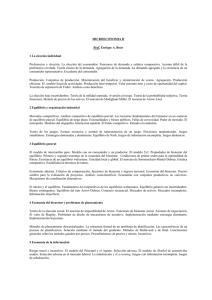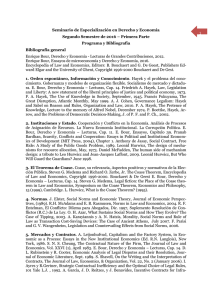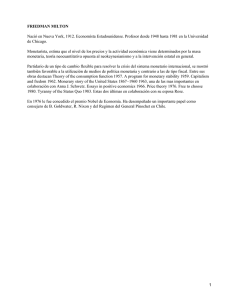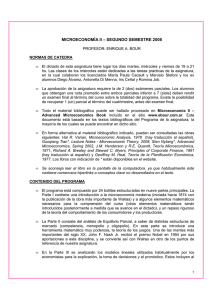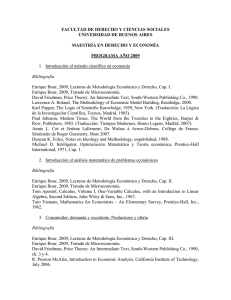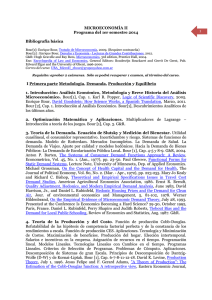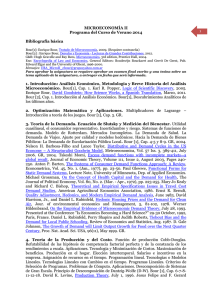Introducción General 1
Anuncio
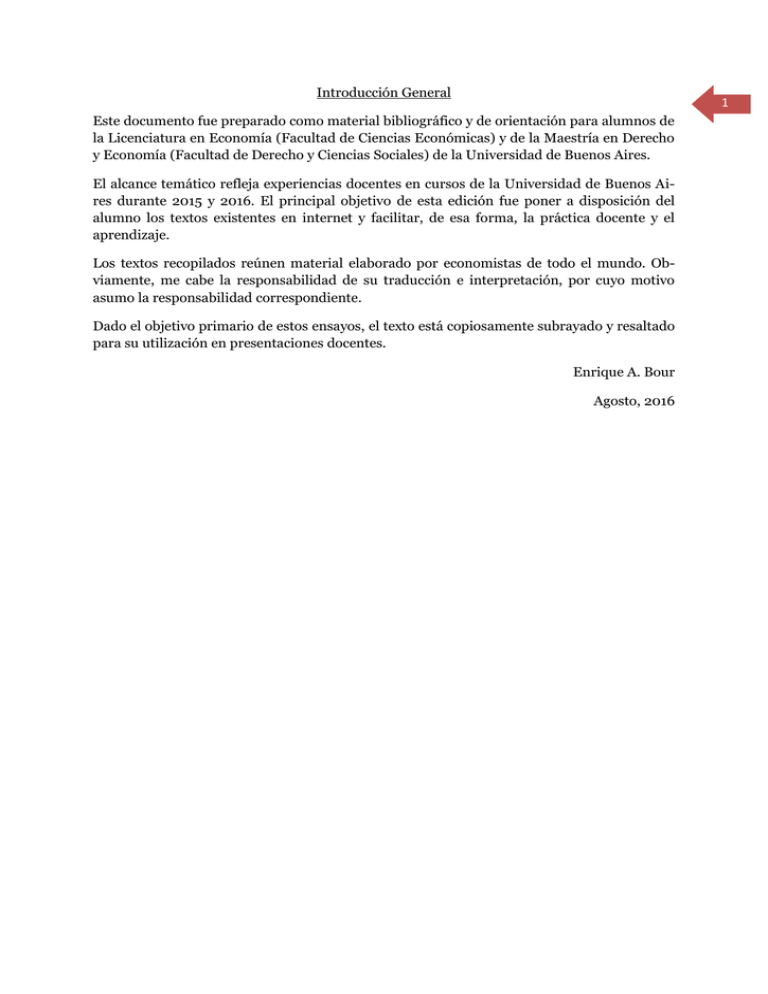
Introducción General 1 Este documento fue preparado como material bibliográfico y de orientación para alumnos de la Licenciatura en Economía (Facultad de Ciencias Económicas) y de la Maestría en Derecho y Economía (Facultad de Derecho y Ciencias Sociales) de la Universidad de Buenos Aires. El alcance temático refleja experiencias docentes en cursos de la Universidad de Buenos Aires durante 2015 y 2016. El principal objetivo de esta edición fue poner a disposición del alumno los textos existentes en internet y facilitar, de esa forma, la práctica docente y el aprendizaje. Los textos recopilados reúnen material elaborado por economistas de todo el mundo. Obviamente, me cabe la responsabilidad de su traducción e interpretación, por cuyo motivo asumo la responsabilidad correspondiente. Dado el objetivo primario de estos ensayos, el texto está copiosamente subrayado y resaltado para su utilización en presentaciones docentes. Enrique A. Bour Agosto, 2016 2. Material básico original usado en estos Ensayos Los textos que se tuvieron en cuenta primariamente son enumerados a continuación: Arrow, Kenneth J., A Difficulty in the Concept of Social Welfare, The Journal of Political Economy, (Aug., 1950). Arrow, Kenneth J., Social Choice and Individual Values, 2nd edition, 1963. Artana, Daniel, Enrique A. Bour, Juan Luis Bour, and Nuria Susmel, Terms of Trade and Economic Growth in Argentina, 2011. Ayres, Ian, Playing Games with the Law, 1990. Beyer, Harald, Ronald H. Coase y su teoría de la Economía y el Derecho, Estudios Públicos, 45, 1992. Bour, Enrique A. Crisis Económicas y Enfoques Complejos, Mayo 2011. Bour, Enrique A. y Carlos Carman, Cables Sueltos, La Trasmisión Eléctrica en la Provincia de Buenos Aires (Comedia), 2003. Bour, Enrique A., Derecho y Economía – Lecturas de Grandes Contribuciones, 2012. Bour, Enrique A., El Fracaso del Estatismo - Una propuesta para la reforma del sector público argentino, Apéndice (1987). Bour, Enrique A., Marx y la teoría económica moderna: Revisión de la Teoría del ValorTrabajo, 2007. Bour, Enrique A., Tratado de Microeconomía, 2009. Cacault, María P., Enrique A. Bour, Diego Álvarez, Iris Ceñal, Romina Job y Antonella di Menna, Otro Problema Económico: El Cambio Climático Global, 2008. Canavese, Alfredo The Effects of Corruption Organization and Punishment on the Allocation of Resources, 2005. Cárdenas, Ernesto y Jair Ojeda, La nueva economía institucional y la teoría de la implementación, 2002. Casal, Paula, Prisionero (Dilema del), en Román Reyes (Dir.): Diccionario Crítico de Ciencias Sociales. Catalá, Joan Prats i, Del Clientelismo al Mérito en el Empleo Público. Análisis de un Cambio Institucional (2006). Cibangu, Sylvain K., Ch. 2 Karl Popper and the Social Sciences, en Gorton, W. A., Karl Popper and the social sciences, 2006. Coase, Ronald H., The Nature of the Firm, 1937. Coase, Ronald H., The problem of social cost, The Journal of Law and Economics, Volume III, October 1960. 2 Davis, Keith, The Case for and against Business Assumption of Social Responsibilities, The Academy of Management Journal, Vol. 16, No. 2, Jun., 1973. Debreu, G., Theory of Value: An Axiomatic Analysis of Economic Equilibrium, 1959. Elzinga, Kenneth G. and David E. Mills, The Lerner Index of Monopoly Power: Origins and Uses, 2011. Farrell, Joseph, Information and the Coase Theorem, Jour. of Ec. Perpspectives, 1987. Friedman, Milton, The Social Responsibility of Business is to Increase its Profits, The New York Times Magazine, September 13, 1970. Gibbons, Robert, An Introduction to Applicable Game Theory, Journal of Economic Perspectives- Volume 11, Number 1-Winter 1997. Gibbons, Robert, Game theory for applied economists, 1992. Golden, Miriam A. and Lucio Picci, Proposal for a new measure of corruption, illustrated with Italian data, 2005. González, Jorge Iván, Hurwicz y el Juez de última instancia, 2008. Gravelle, Hugh and Ray Rees, Microeconomics, 3rd. edition, 2004. Hammond, Peter, The Role of Information in Economics, L'Informazione nell' Economia e nel Diritto (Milan, 1990). Hardin, Garrett, The Tragedy of Commons, Science, v. 162 (1968). Hardin, Russell, The Free Rider Problem, The Stanford Encyclopedia of Philosophy, 2013. Hawkins, David and Herbert A. Simon. Note: Some Conditions of Macroeconomic Stability, 1949. Hayek, Friedrich A. von, The Use of Knowledge in Society, 1945. Hayek, Friedrich A. von, comp., Collectivist Economic Planning: Critical Studies on the Possibilities of Socialism, George Routledge and Sons, Londres, 1935. Heal, Geoffrey M., The Theory of Economic Planning, 1973. Traducción: Teoría de la planificación económica, 1977. Holt, Charles A. and Alvin E. Roth, The Nash Equilibrium: A Perspective, 2004. Hurwicz, Leonid, But Who Will Guard the Guardians? 1998. Jehle, Geoffrey A. and Philip J. Reny, Advanced Microeconomic Theory (3rd edition), 2011. Khalitova, Alla, Xiao Qin, Jeff Faris and Lijing Song, Perfect Equilibrium in A Bargaining Model, 2012. Klitgaard, Robert, International Cooperation Against Corruption, Finance & Development / March 1998. 3 Knight, Frank, Risk, Uncertainty and Profit, 1921, Reprinted 1957. Koopmans, Tjalling C., Analysis of Production as an Efficient Combination of Activities, in Koopmans, T. C., ed., Activity Analysis of Production and Allocation, 1951. Kornai, János, Eric Maskin y Gérard Roland, Understanding the soft budget constraint, 2002. Kornai, János, So What Is Capital in the Twenty-First Century? Some Notes on Piketty’s Book, Capitalism and Society - Volume 11, Issue 1, Article 2, 2016. Kornai, János, What the Change of System from Socialism to Capitalism Does and Does not Mean, 2000. Krugman, Paul, Notes on Walmart and Wages (Wonkish), 2015. Lal, Deepak, Reviving the Invisible Hand: The Case for Classical Liberalism in the TwentyFirst Century, Introduction, Princeton, N.J.: Princeton University Press, 2006. Landes, William and Richard Posner, Market Power in Antitrust Cases, 1980. Lange, Oskar, The Computer and the Market, 1967, en C. H. Feinstein, ed., Socialism, Capitalism and Eco-nomic Growth. Lerner, Abba P., The Concept of Monopoly and the Measurement of Monopoly Power, 1934. Levin, Jonathan, Bargaining and Repeated Games, 2002. MacKaay, Ejan, History of Law and Economics, 2000. Mackaay, Ejan, Le droit saisi par le jeu (Droit et Société, 17/18, 1991). McAdams, Richard H., Beyond the Prisoners' Dilemma: Coordination, Game Theory, and Law, 2009. McKelvey, Richard D., Intransitivities in Multidimensional Voting Models and Some Implications for Agenda Control, Journal of Economic Theory (1976). Milgrom, P. R., D. C. North, and B. R. Weingast, The Role of Institutions in the Revival of Trade: The Medieval Law Merchant, Economics and Politics, March 1990, Vol. 2, No. 1. Moe Terry M. and Scott A. Wilson, Presidents and the Politics of Structure, Law & Contemp. Probs. (1994). Moe, Terry M., An Assessment of the Positive Theory of 'Congressional Dominance', Legislative Studies Quarterly, (Nov., 1987). Moe, Terry M., The New Economics of Organization, American Journal of Political Science, 1984. Moe, Terry M., The Revolution in Presidential Studies, Presidential Studies Quarterly, December 2009. 4 Moe, Terry M., The Theory of Bureaucratic Structure, en John E. Chubb y Paul E. Peterson (ed.), Can the Government Govern? The Brookings Institution, 1989. Morishima, Michio, Marx’s Economics – A dual theory of value and growth, 1973. Morishima, Michio, Walras' Economics – A Pure Theory of Capital and Money, 1977. Myerson, Roger B. Learning from Schelling's Strategy of Conflict, 2009. Myerson, Roger B., Fundamental Theory of Institutions: A Lecture in Honor of Leo Hurwicz, The Hurwicz Lecture, University of Minnesota, June, 2006. Myerson, Roger B., Justice, Institutions, and Multiple Equilibria, January 2004. Myerson, Roger B., Learning from Schelling's 'Strategy of Conflict', University of Maryland in honor of Thomas C. Schelling, Sept. 29, 2006. Myerson, Roger B., Nash Equilibrium and the History of Economic Theory, 1999. Nasar, Sylvia, The Lost Years of a Nobel Laureate, New York Times, 1994. Nash, John F., Equilibrium Points in N-Person Games, Proc. Nat. Acad. Sci. USA, Vol. 36, 1950. Nash, John, The Bargaining Problem, 1950. Niskanen, William A., The Peculiar Economics of Bureaucracy, 1968. North, Douglass C., Institutions Matter, 1994, Economic History North, Douglass C., Institutions, The Journal of Economic Perspectives, 5 (1), 1991. North, Douglass C., The New Institutional Economics (1986). Traducción: La nueva Economía Institucional, Revista Libertas 12 (1990). Olivera, Julio H. G., El Principio de Howarth, Revista de Economía Política de Buenos Aires, 2007. Picker, Randal, An Introduction to Game Theory and the Law, 1994. Piketty, T., Capital in the Twenty-First Century, translated by Arthur Goldhammer, Cambridge, MA: Belknap Press, 2014. Pindyck, Robert S. y Daniel L. Rubinfeld, Microeconomía, Séptima Edición, Madrid, 2009. Rasmusen, Eric, Games and Information: An Introduction to Game Theory, [1989] 4th edition (2006). Rizvi, S. Abu Turab, The Sonnenschein-Mantel-Debreu Results after Thirty Years, History of Political Economy 38 (annual suppl.) 2006. Roemer, John E., Socialism, The New Palgrave Dictionary of Economics, Jan. 2005. Ross, Don, Game Theory, The Stanford Encyclopedia of Philosophy, Winter 2014 Edition. 5 Rubin, Paul, Law and Economics, The Concise Encyclopedia of Economics. Rubinstein, Ariel, A review on: “A Beautiful Mind: A Biography of John Forbes Nash Jr.” by Sylvia Nasar, 1999. Rubinstein, Ariel, Dilemmas of an Economic Theorist, Econometrica, 2006. Traducción: Dilemas de un Teórico Económico, 2006. Rubinstein, Ariel, Perfect Equilibrium in a Bargaining Model, 1982. Samuelson, Paul A., The Pure Theory of Public Expenditure, 1954. Schenone, Osvaldo H., An Economic Approach to Corruption, 2003. Schumpeter, Joseph A., History of Economic Analysis, 1950. Soyoun, Kim & Daeyeol Lee, Corteza prefrontal y toma de decisiones impulsiva, 2012. Stahl, Ingolf, Bargaining Theory, 1972. Stiglitz, Joseph, Information and the Change in the Paradigm in Economics, 2001. Streb, Jorge, John Nash, el último padre fundador de la teoría de juegos, y la evolución del concepto de equilibrio desde Cournot, 2015. Suen, Wing, A Diagrammatic Proof That Indirect Utility Functions Are Quasi-Convex, 1992. Tanzi, Vito and Hamid Davoodi, Chapter 4 Corruption, Public Investment, and Growth, The Welfare State, Public Investment and Growth, edited by Hirofumi Shibata and Toshihiro Ihori (1998). Teijeiro, Mario, Empujando a China al keynesianismo, 2006. Vanderbei, Robert J., Linear Programming: Foundations and Extensions, 2001. Varian, Hal R., Microeconomic Analysis, 3rd edition, 1992. Vives, Xavier, Cournot and the Oligopoly Problem, 1989. Von Neumann, John and Oscar Morgenstern, Theory of Games and Economic Behavior. 1944. Ward, Benjamin, The Firm in Illyria: Market Syndicalism, Am. Ec. Rev., 1958. Williamson, Oliver, The New Institutional Economics: Taking Stock, Looking Ahead, 2000. Yildiz, Muhamet, Nash meets Rubinstein in final-offer arbitration, 2011. 6
